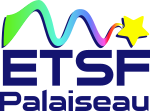The group is well committed in developing ab inito codes for theoretical spectroscopy. It is in fact crucial to have its own computer codes, which allow scientists to implement, test and benchmark new features in an efficient and robust way. Often models are used as a first step, but the ambition of the group is to make, and to make available, realistic calculations. Therefore the group, on top of members being co-developers of the ABINIT package for the GW part, maintains, develops, teaches and aims to make freely available three main codes:
DP  is a TDDFT code working in linear response regime, with a plane wave basis and in frequency domain. The authors are Francesco Sottile, Lucia Reining and Valerio Olevano (former group member and now in Grenoble). The code is freely available and under heavy development at the moment, in order to introduce new features (like new kernels, netcdf format, compatibility with newer versions of Abinit and Quantum Espresso, etc.). A snapshot of a relatively new version is available here. For older (but also more robust) versions, please refer to the old website.
is a TDDFT code working in linear response regime, with a plane wave basis and in frequency domain. The authors are Francesco Sottile, Lucia Reining and Valerio Olevano (former group member and now in Grenoble). The code is freely available and under heavy development at the moment, in order to introduce new features (like new kernels, netcdf format, compatibility with newer versions of Abinit and Quantum Espresso, etc.). A snapshot of a relatively new version is available here. For older (but also more robust) versions, please refer to the old website.
 EXC is an exciton code, aiming at solving the Bethe-Salpeter equation, in transition space and frequency domain. Exactly like DP, it is under heavy development (netcdf, compatibility) and new features are always implemented, like finite momentum transfer and improved parallelization. The authors are Valerio Olevano, from Grenoble, Giovanni Onida (professor in Milan), Stefan Albrecht (former PhD in the group), Lucia Reining and Francesco Sottile. The code is freely available on the official website www.bethe-salpeter.org.
EXC is an exciton code, aiming at solving the Bethe-Salpeter equation, in transition space and frequency domain. Exactly like DP, it is under heavy development (netcdf, compatibility) and new features are always implemented, like finite momentum transfer and improved parallelization. The authors are Valerio Olevano, from Grenoble, Giovanni Onida (professor in Milan), Stefan Albrecht (former PhD in the group), Lucia Reining and Francesco Sottile. The code is freely available on the official website www.bethe-salpeter.org.
 2light is a TDDFT code for the non-linear properties of materials. It calculates second and third-order polarizabilities. The authors are Valérie Véniard and Eleonora Luppi (former group member and now in Paris). The code not yet ready for distribution.
2light is a TDDFT code for the non-linear properties of materials. It calculates second and third-order polarizabilities. The authors are Valérie Véniard and Eleonora Luppi (former group member and now in Paris). The code not yet ready for distribution.
 Besides the developments of ab initio theoretical spectroscopy codes, the group has shared several post-processing tools to carry out interpolations, spectral function calculations or managing the spectra obtained by DP/EXC or Abinit. You will find more in the tools page.
Besides the developments of ab initio theoretical spectroscopy codes, the group has shared several post-processing tools to carry out interpolations, spectral function calculations or managing the spectra obtained by DP/EXC or Abinit. You will find more in the tools page.
